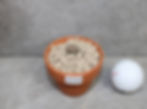"The plant you will receive, will be similiar to the plant featured in the pictures!"
Thelocactus bicolor, commonly known as the Glory of Texas, is a striking and resilient cactus prized by collectors and desert gardeners alike for its vibrant beauty and hardiness. Native to the arid regions of Texas and northern Mexico, this small to medium-sized cactus brings a dramatic flair to cacti collections.
Thelocactus bicolor features a spherical to slightly cylindrical body, often growing up to 8 inches tall and 6 inches wide. Its surface is covered with prominent ribs adorned with long, dramatic spines that range in color from silvery white to reddish brown, adding year-round visual interest. The spines not only serve a protective function but also enhance the plant’s architectural appeal.
What truly earns this cactus its name—the Glory of Texas—is its breathtaking floral display. In late spring to early summer, the plant bursts into bloom with large, funnel-shaped flowers that can reach up to 4 inches in diameter. These blooms showcase dazzling shades of magenta or deep pink with lighter centers, often lasting several days and attracting pollinators such as bees and butterflies. The vivid contrast between the blossoms and the cactus's rugged body makes for a show-stopping centerpiece in any cactus collection.
Thelocactus bicolor is well-suited to bright, sunny conditions and thrives in well-draining soil, making it an excellent choice for a greenhouse (heated in winter), conservatory, or sunny windowsill in the UK. While it is naturally drought-tolerant and prefers dry conditions between waterings, maintaining a warm, frost-free environment—especially during the winter—is essential for its health and flowering. With minimal care, this cactus will reward UK growers with its bold structure and vibrant flowers—a true desert gem bringing the Glory of Texas into British collections.
Caution: Toxic if eaten.
Thelocactus bicolor
Please ensure that you have your substrate and pot ready for your new plant! Sending plants bare rooted is the safest way to protect them, from damage in transit and rot.
%20(1)_edited.png)















